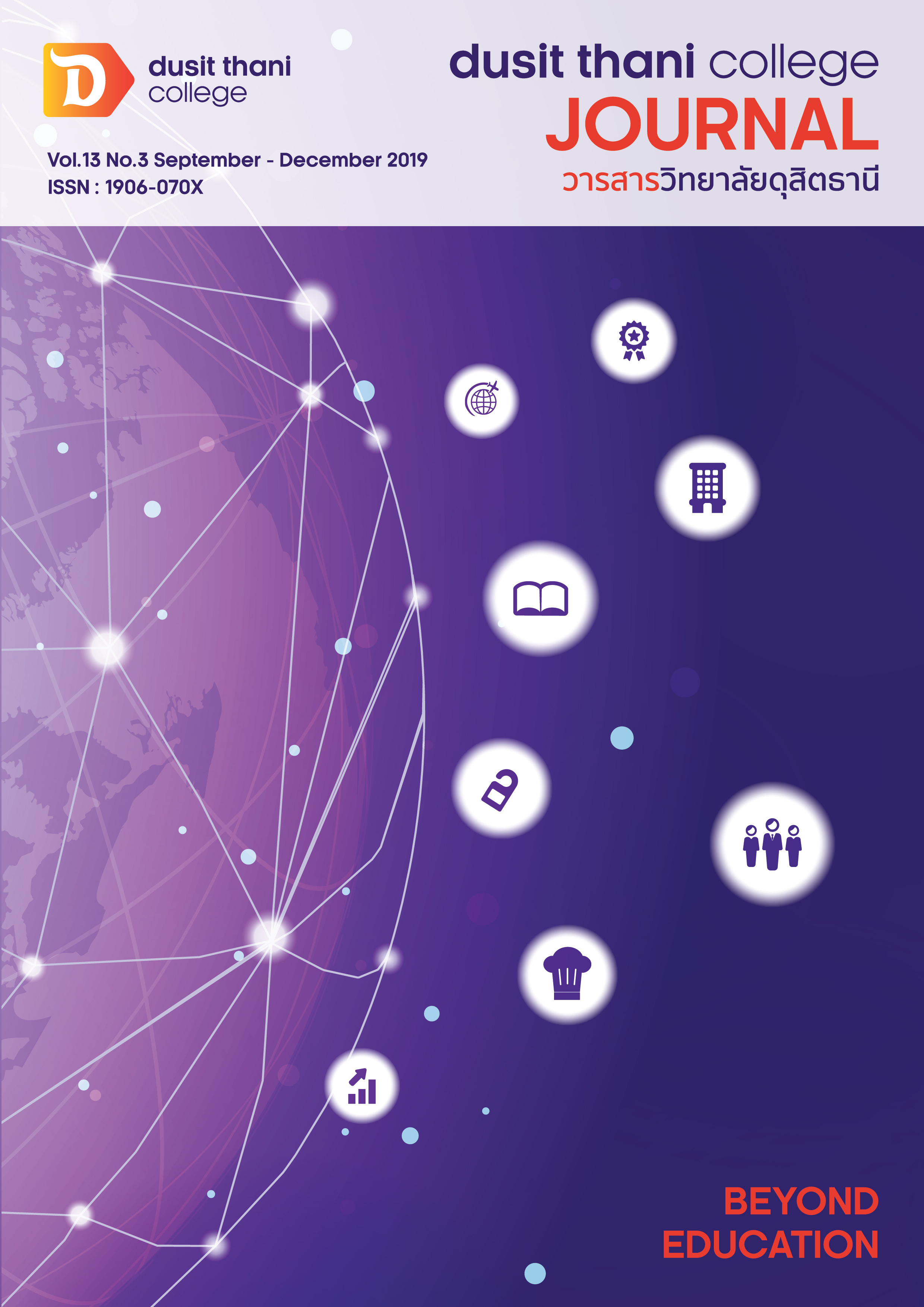Halal Standards Setting for Promoting Halal Business
Main Article Content
Abstract
The objectives of this research were 1) to study Halal knowledge and 2) to set Halal standards for Halal business promotion. Qualitative Research based on documentary research methods, related to Halal documents. Data analysis was based on the content analysis of Halal standards collected from the documents, and brainstorming from relevant people to summarize the content analysis process for the Halal standards for Halal Promotion.
The results found that the knowledge about Halal consists of three parts: Halal and Islamic Principles, Halal Principles and Halal Certification. The results of Halal standards for Halal promotion include: 1) Halal management standards contain with places and facilities management and Personnel Management 2) Halal operation standards for Halal products or services include Halal standards for raw materials, materials and equipment, including the process of Halal cooking and Halal services.
Article Details
Article Screening Policy
- All research and academic articles to be published must be considered and screened by three peer reviews in the relevant field / article.
- All articles, texts, illustrations and tables published in the journal are the personal opinions of the authors. Editors don't always have to agree. And no responsibility whatsoever is the sole responsibility of the author.
- The articles to be published must never be published. Where did you first publish? And not in the consideration of other journals If the audit found that there has been a duplicate publication It is the sole responsibility of the author.
- Any article that the reader sees as being plagiarized or impersonated without reference. Or mislead the work of the author Please let the journal editor know it will be your greatest blessing.
References
2. Aree, S. (2015). Halal Tourism: Opportunity for Thailand in ASEAN Economic Community. 2. 2. 2.Journal of Humanities and Social Sciences, Rangsit University. 10(18), 22 – 38.
3. Aree, S., et. al. (2012). Opportunities and chance to enter the market of Halal food business in Indonesia. Bangkok: International Institute for Trade and Development.
4. Bangkokbiznews. (2017, 27 June). The world population surpassed 9.8 billion people. Retrieve from http://www.bangkokbiznews.com/news/detail/760909.
5. Chandra, G. (2014). Halal Tourism: A New Goldmine for Tourism. International Journal of Business. 4(December), 45 – 62.
6. Department of Tourism. (2012). Food Service Standards for Tourism. Bangkok:
Ministry of Tourism & Sport.
7. Elo, S. and Kyngas, H. (2007). The qualitative content analysis process. Journal of Advanced Nursing. 62(1), 107 – 115.
8. Fraenkel, R. J., & Wallen, E. N. (2000). How to design and evaluate research in education (4th ed.). San Francisco: McGraw-Hill.
9. Kraomkeaw, A. (2012). Hotel renovation to cater to Muslim travelers : a case study of hotels in the Bangkok Metropolitan area. Master’s Thesis in Housing Development, Chulalongkorn University.
10. Laopradith, P. (2010). The competitiveness of Halal food exports in canned and processed seafood products of Thailand. Srinakharinwirot University.
11. Luthfi, B., ank Salehudin, I. (2011). Marketing Impact of Halal Labeling Toward Indonesian Muslim Consumer’s Behavioral Intention Basad on Ajzen’s Planned Behavior Theory: Policy Capturing Studies on Five Different Product Categories, ASEAN Marketting Journal, 3(1).
12. MasterCard & CrescentRating. (2015). Global Muslim Travel Index 2015. Retrieved from https://skift.com/wp-content/uploads/2015/03/MasterCard-Muslim-Index.pdf.
(10 June 2017).
13. National Bureau of Agricultural Commodity and Food Standards. (2007). Announcement of the National Committee on Agricultural Commodity and Food Standards, National Standard for Agricultural and Food Products: Halal Foods. ACFS.
14. Nunabee, S. (2016). Consumers behavior and factors affecting purchasing decision of consumers on Thai Halal food in South India. The Halal Science Center Chulalongkorn University.
15. Prachachat. (2017, 16 April). Halal Market Trend is strong, Muslim guru pointed out that Thailand is not enthusiastic enough. Retrieve from https://www.prachachat.net/ facebook-instant-article/news-140361.
16. Puangniyom, P., et. al., (2017). Halal Tourism Strategy to Promote Sustainable Cultural Tourism in Thailand. 2017 CEBU International Conference on Studies in Arts, social Sciences and Humanities.
17. Ruangkalapawongse, S. and Ruangkalapawongse, A. (2015). Factors influencing the intention to buy a cooked and frozen Halal food products of the Muslim consumers in Bangkok metropolitan area. Panyapiwat Journal, 7(2), 71 – 83.
18. Salaemae, D. (2013). People’s Participation in the Development of the Halal Food Industrial Esstate, Pattani Province. Master’s thesis in Social Development. Songkla:
Prince of Songkla University.
19. Schmuck, R. A. (2006). Pratical Action Research for Change. 2nd edition. Thousand Oaks, CA: Cowin Press.
20. The Halal Science Center Chulalongkorn University. (2017). Halal Standard Task. Retrieve from http://www.halalscience.org/service/งานมาตรฐานฮาลาล. (21 September 2017).
21. The Halal Standard Institute of Thailand. (2014). Halal Standard Book 1. Bangkok:
The Halal Standard Institute of Thailand.
22. The Halal Standard Institute of Thailand. (2016). Halal Classroom. Retrieve from http://halal.or.th/ (10 May 2017).
23. Wacharaphan, P., Tulayaporn, V., and Cherdrangsri, K. (2008). Marketing Potential Development of Halal Food for Exporting of Thailand. Songkla: Prince of Songkla University.


